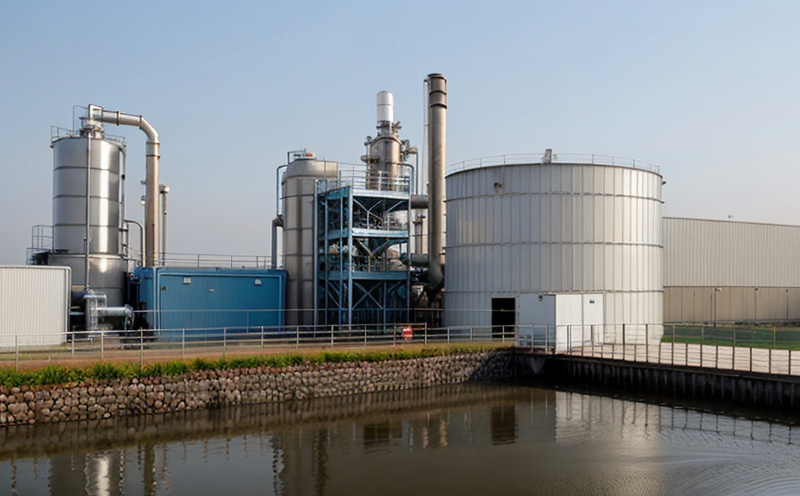ASTM D5908 Suspended Solids Testing in Industrial Water
The ASTM D5908 test method is a standard procedure used to determine the concentration of suspended solids in industrial water. This testing is crucial for ensuring that water quality meets regulatory standards and operational efficiency requirements within processing facilities. Suspension of solid particles, such as sand, silt, or other particulates, can impact various aspects of an industrial facility's operations.
Industrial water systems are integral to manufacturing processes across many sectors, including food and beverage, pharmaceuticals, electronics, and chemical production. In these environments, maintaining clean and clear water is paramount for preventing contamination, preserving equipment integrity, and ensuring product safety. ASTM D5908 provides a standardized approach to measuring suspended solids content in industrial water, thereby enabling quality control teams to monitor and manage the quality of their water supply.
Water with high levels of suspended solids can lead to increased wear on pumps and filtration systems, reduced efficiency in heat exchangers, and potential contamination risks. By adhering to ASTM D5908 standards, facilities can ensure they are meeting both internal operational needs and external regulatory requirements. The test involves filtering a known volume of water through a pre-weighed filter membrane, drying it under specific conditions, then reweighing the membrane post-filtration.
The resulting difference in weight before and after filtration provides the mass concentration of suspended solids per unit volume. This data is essential for process optimization, ensuring product quality, and complying with environmental regulations such as ISO 14001 or local water discharge standards like those set by the EPA (United States) or ECHA (European Union).
ASTM D5908 testing also helps in identifying potential sources of contamination within the facility. By regularly monitoring suspended solids levels, facilities can pinpoint areas where corrective actions are needed to maintain optimal water quality.
Why Choose This Test
- Regulatory Compliance: Ensures adherence to industry-specific standards and local regulations, such as EPA guidelines for drinking water or ISO 14001 environmental management systems.
- Operational Efficiency: Helps identify and mitigate issues that arise from suspended solids in industrial water, enhancing the longevity of equipment and reducing downtime costs.
- Product Quality Assurance: Guarantees product integrity by ensuring raw materials are free from contamination, which is particularly important for industries like pharmaceuticals where purity is critical.
- Environmental Stewardship: Minimizes environmental impact by preventing contaminated water from being discharged into natural water bodies.
Customer Impact and Satisfaction
The implementation of ASTM D5908 testing provides significant benefits to industrial facilities, enhancing their overall operational efficiency and customer satisfaction. By ensuring that the water used in manufacturing processes meets high-quality standards, companies can minimize equipment failures and extend the lifespan of critical machinery.
For customers, this translates into higher product quality and reliability, which are essential factors for maintaining brand reputation and gaining a competitive edge in the market. Compliance with industry regulations also builds trust among stakeholders, including regulators, suppliers, and partners, further boosting customer confidence.
Moreover, regular testing of suspended solids contributes to sustainable practices by helping facilities reduce their environmental footprint through more efficient water usage and waste management strategies. This aligns with broader corporate sustainability goals and can contribute positively towards certifications like ISO 14001 or LEED (Leadership in Energy and Environmental Design).
By investing in ASTM D5908 testing, industrial facilities not only protect their reputation but also ensure long-term profitability by avoiding costly disruptions due to equipment failure or non-compliance issues.
Environmental and Sustainability Contributions
The use of ASTM D5908 suspended solids testing plays a vital role in promoting environmental sustainability within industrial operations. By accurately measuring the concentration of suspended particles, facilities can better understand their impact on wastewater discharge and take proactive measures to reduce it.
One key contribution is the prevention of contamination in natural water bodies. High levels of suspended solids can lead to excessive algae growth, oxygen depletion, and harm aquatic life when discharged into rivers, lakes, or oceans. By adhering to ASTM D5908 standards, industrial facilities help maintain healthy ecosystems by ensuring their wastewater meets stringent discharge limits.
Additionally, this testing supports broader sustainability initiatives by encouraging the adoption of cleaner production technologies and practices. Facilities that consistently monitor suspended solids levels are more likely to implement innovative solutions aimed at reducing waste generation and improving resource efficiency.
The data obtained from ASTM D5908 tests can also inform decision-making processes related to water reuse projects, enabling facilities to recycle treated wastewater for non-potable uses within the plant. This reduces overall water consumption and aligns with principles of circular economy.





